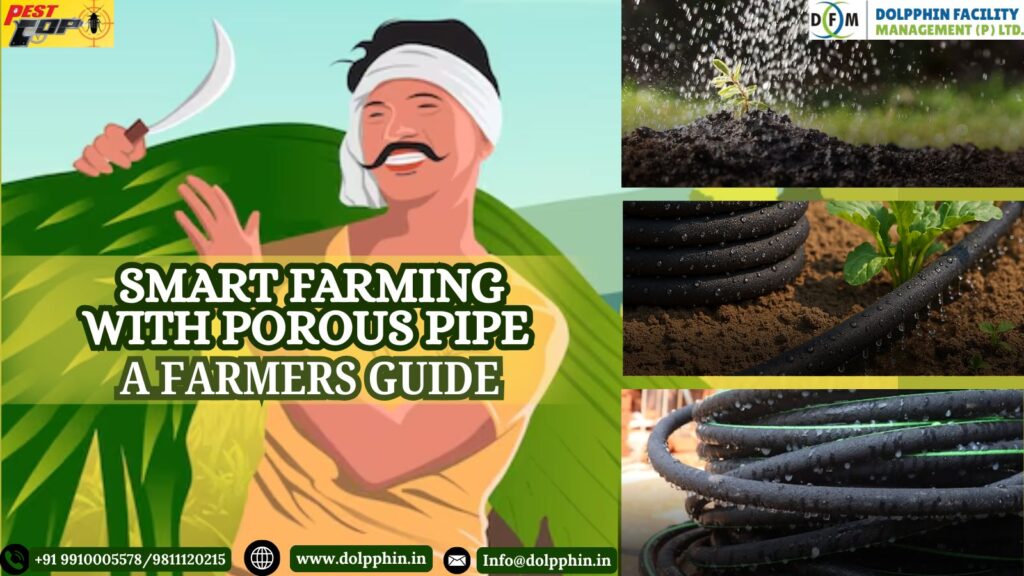
As water scarcity and climate variability increase, farmers are adopting intelligent solutions to achieve sustainable agriculture. Porous pipe irrigation is one such innovation that is transforming irrigation. Whether you run a large agricultural operation or are a small-scale farmer, porous pipes can help you save money, increase crop yield, and conserve water while also protecting the environment.
What Are Porous Pipes?
Specialized irrigation tubes known as porous pipes are composed of recycled plastic or rubber and have tiny pores running the length of them. To ensure constant moisture delivery without waste, these pipes “sweat” water evenly underground, right at the root zone.
Key attributes:
- composed of recycled and environmentally friendly materials.
- Water seeping continuously (not spraying).
- uses a low water pressure to function.
- Perfect for irrigation below ground.
The Process of Porous Pipe Irrigation
The action of capillary is the basis for how porous pipe irrigation works. The pipe gradually releases water through its pores after being connected to a water source, preserving the soil’s constant moisture content.
Systematic Procedure:
- Pipes are buried close to the roots.
- Low-pressure pumps or gravity are used to supply water.
- Water is released from pores uniformly along their length.
- There is no runoff or evaporation loss because the soil absorbs moisture.
Advantages of Using Porous Pipes in Farming
✅ Water Efficiency: Up to 70% less water is used than with conventional techniques.
✅ Root-Level Irrigation: This method increases crop growth and health by delivering water straight to the roots.
✅ Low Maintenance: If installed correctly, resistant to blockages and clogging.
✅ Fertilizer Delivery: The pipe system can also be used to deliver liquid nutrients.
✅ Weed Control: By keeping the surface dry, weed growth is inhibited.
✅ Perfect for Any Terrain: Performs admirably in regions with sandy, hilly, or uneven soil.
The Best Crops for Irrigation with Porous Pipes
Many crops can benefit from porous pipes, particularly those that require consistent moisture levels:
- Vegetables: onions, carrots, cucumbers, and tomatoes
- Fruits: melons, strawberries, and grapes
- Nurseries: Flowers and ornamental plants
- Field crops : include cotton and sugarcane (in rows).
- Greenhouse plants: are perfect for regulated settings.
How to Set Up Your Farm with Porous Pipes
The process of installing porous pipes is easy and reasonably priced. Here’s how:
Materials Required:
- Permeable pipes
- system for filtering (clean water)
- Low-pressure pump or a water tank
- Control valves
- Pipe fittings and connectors
Steps for Installation:
- Get the field ready: Mark the rows and till the soil.
- Place the pipe close to the root zones, 6 to 10 inches below the surface.
- Attach to a water line or tank to connect to the water source.
- To avoid clogs, install a filter system.
- To test and monitor, run water and look for consistent seepage.
- Pro Tip: For improved control, use flow meters and pressure regulators.
Maintenance and Long-Term Use Advice
Use these pointers to make sure your porous pipe system continues to function effectively for many years:
- Every week, clean the filter.
- Every month, flush the pipes.
- Steer clear of high-pressure water.
- Look for obstructions in areas that are dry.
- Replace any damaged pipe segments as soon as possible.
Success Stories of Smart Farming
🍅 Maharashtra Tomato and Cucumber Farmer
This farmer’s yield of tomatoes and cucumbers increased by 35% in just one season after putting in porous pipe irrigation over two acres. Nearly 60% less water was used, and the crops grew more consistently.
🍓 Himachal Pradesh Strawberry Grower
During the growing season, this small-scale farmer saved more than 30,000 liters of water per acre by using porous pipes for precise root-level watering. The strawberries lasted longer and were more colorful.
🥕🌽🌶 Punjabi Mixed Crop Farmer
Porous pipe irrigation resulted in a 30% overall improvement in crop health and a 50% reduction in the amount of manual labor required on a 5-acre farm that grew maize, carrots, and capsicum. Because of the dry surface soil, weed growth also decreased.
🌻 Karnataka Flower & Vegetable Nursery
For coriander, spinach, and marigolds, a nursery that used porous pipes saw increased plant survival rates and quicker growth cycles. Increased saleable output and less plant stress were two benefits of uniform moisture levels.
Conclusion
With its ability to deliver water precisely, minimize waste, and produce healthier crops, porous pipe irrigation is revolutionizing modern farming. Farmers can lower expenses, conserve essential resources, and increase productivity by implementing this clever and sustainable approach. For today’s agricultural challenges, porous pipes offer an effective solution, whether you’re growing fruits, vegetables, or nursery plants.
Make the switch to more environmentally friendly, porous irrigation!